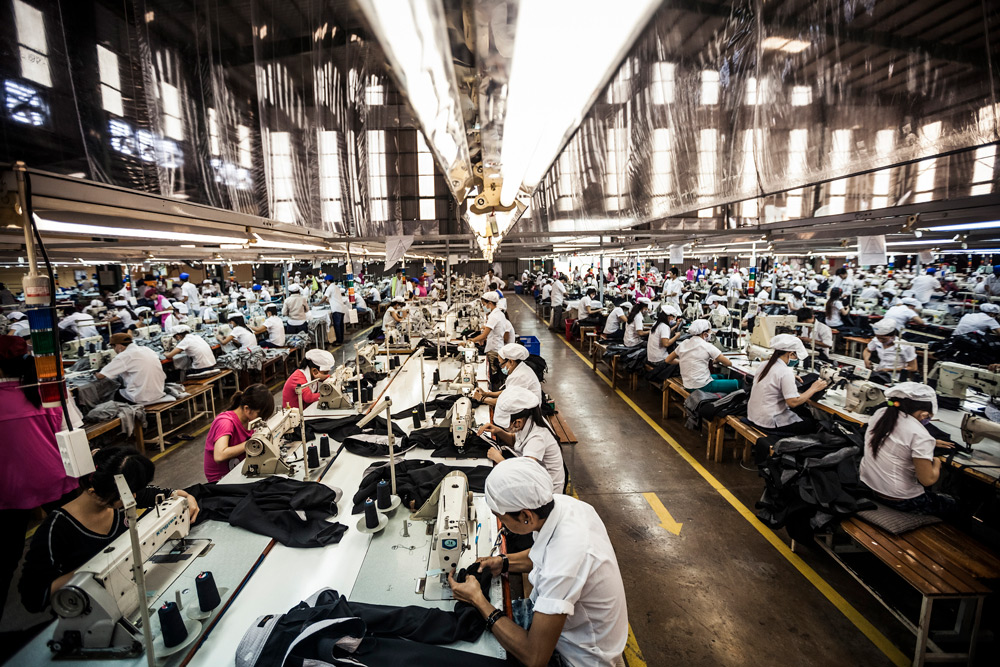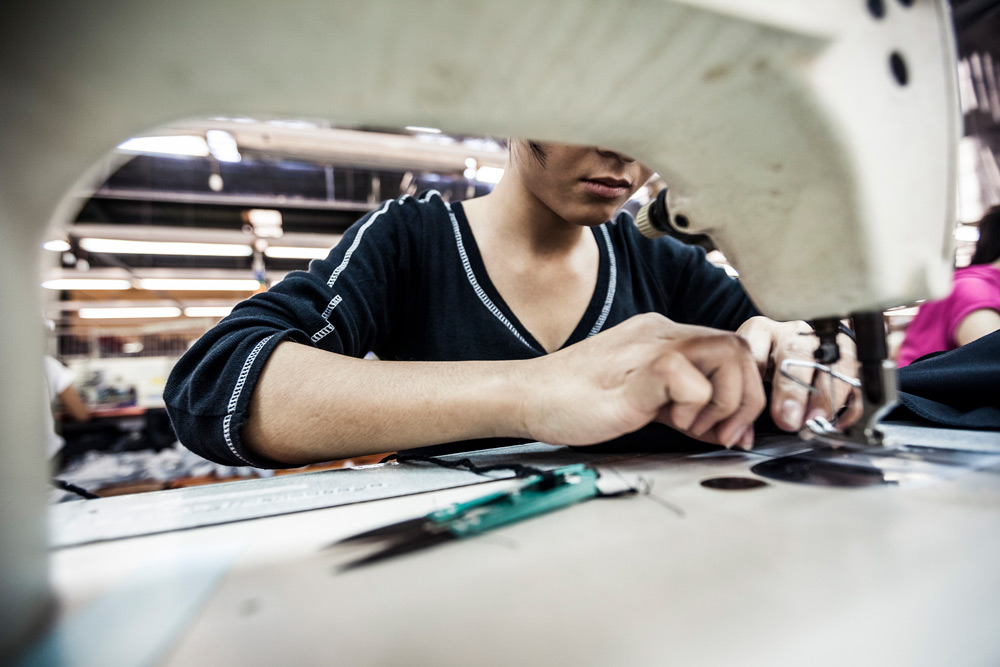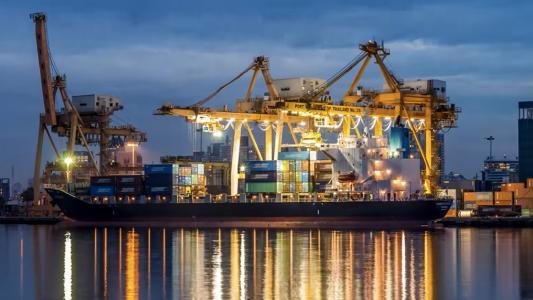Over the last few decades, China’s manufacturing sector has grown into a global economic behemoth, providing an easy path to market for American entrepreneurs and inexpensive goods for American consumers.
In an episode of Challengers, we profiled Flexport, the shipping logistics startup that is revolutionizing how we trade with countries like China. But we also wanted to talk to someone who sells the goods inside those shipping containers. So we reached out to Greg Shugar, co-founder of both Tie Bar (which Forbes recently called “the Warby Parker of men’s accessories”) and Thread Experiment, “the first ever brand of home bedding dedicated to men.”
Way back in 2004, Shugar recognized the benefits of working directly with Chinese factories. Using Alibaba, he was able to start Tie Bar out of his Chicago basement and provide department-store-quality ties at thrift-store prices. In 2013, he sold a majority stake in the company to an equity firm for eight figures, and then turned around to launch Thread Experiment.
Shugar was kind enough to chat with me last week about how entrepreneurs can work with Chinese manufacturers.
Mike Riggs: I’ve spent the last two weeks reading everything I can get my eyes on about manufacturing in China. The biggest thing I’ve learned–and I’m sure this will make tech people roll their eyes–is that Alibaba is not just the Chinese version of Amazon.
Greg Shugar: Yeah, when I started my first company in 2004, Alibaba was this sort of business-to-business matchmaker between overseas factories and importers in the U.S., Europe, and elsewhere. Over the years, Alibaba has morphed into a retail website as well. After that shift is when American media started covering it in a big way, which is why you think it’s more of an Amazon marketplace. Because it is, but that’s not how it started. And the business-to-business aspect still remains.
Mike Riggs: How did you know way back in 2004 that Alibaba’s manufacturing marketplace was the right way to get your products made? What caused you to think, “This is a safe bet?”
Greg Shugar: I had not heard of it in 2004, but I would say most people hadn’t either. I found it just through Google searching. They used a grading system for factories, and it was based on things like quality of product, timing, communication, honesty, the factory conditions. They also went out and inspected these factories and graded them accordingly. And I just believed it.
Also, it’s free, right? For us, it’s free, for the factory it’s not. So for free you can just email these people and start engaging in conversations, you can look at their website and talk to them online, or through messenger, or email, whatever. And then you can just go off your own human instincts to determine whether or not they’re real.
Mike Riggs: I’m guessing that because you’re an entrepreneur, you have a different way of approaching risk than someone like myself, who has always worked for other people.
Greg Shugar: Yeah, well, I mean that was my first venture. I was an attorney beforehand, and you might argue I was averse to risk, but good at measuring it. At the beginning of talking to a factory, you ask for samples. If they say, “Okay, I’m going to send it to you and it will arrive in three days,” and it arrives in three days, that tells you something.
After some of these exchanges, I reached a point where I felt comfortable enough to place an order with the factory. I did it as a letter of credit and put the payment in escrow. Essentially you pay a little upfront and the balance gets delivered to the factory after they ship, so there’s a few ways to hedge when you don’t know who you’re dealing with. But we found our first factory that way, which definitely made me a believer.
I use my instincts, like every entrepreneur. And you probably do a lot more of that than you realize, because you assess risks every day.
Today, I use my instincts, like every entrepreneur. And you probably do a lot more of that than you realize, because you assess risks every day. The tolerance level might be different, but we all have to take risks.
Mike Riggs: So you’ve been working with Chinese factories for 12 years. Are things smoother since you started in 2004? Is the process easier? Do you have more confidence in conducting relationships across that vast geographical and cultural gap?
Greg Shugar: I’ve been working with Chinese factories almost nonstop since 2004, and I also do consulting for other companies that want to work with Chinese factories. The process has definitely gotten more comfortable for me, and I always wonder if that’s because the Chinese have made it easier, or I’ve just gotten more experience. It’s probably a combination of the two.
It’s definitely easier to communicate. Apps that allow you to communicate for free internationally have made things much better. Skype and video conferencing were both huge.
The Chinese factories themselves, of course, have gained a lot more experience. If you were to visit China in 2004, versus today, you’d see an amazing improvements in many of these manufacturing towns. And they’ve certainly improved how they deal with American importers.

As far as what the Chinese have gotten good at, it’s everything from communication to efficiency, and frankly the quality of manufacturing. These factories really understand the demand for American quality.
I remember in the old days telling my factory, “Hey, my customer returned a necktie because there was a pull in the thread,” and I was basically told that they make hundreds of thousands of ties that ultimately get shipped to department stores, and so they never really heard from customers directly. The information would never be channeled back to the manufacturer.
Now they’re starting to hear from all of these small importers who talk to their customers all the time. So when the products start to fall apart in some way, we have a ton of information. A lot of times we even have the product itself that we can share with the factory. Doing that helps improve their work and keeps them honest.
Mike Riggs: I’ve been thinking a lot about the “made in China” stereotype, and how silly it feels today. I don’t know that I own anything that’s not made in China, and I’m pretty happy with all the products in my life.
Greg Shugar: “Made in China” definitely has a negative stigma with some people. And for some products I would say it’s apt–Chinese products aren’t as good. But Chinese manufacturers also don’t profess to be good at making everything. They’re not trying to replicate the European-handmade-fine-product model.
Chinese factories deal in enormous minimums and production schedules, so they prefer mass market. At the same time, they’ve gotten better at delivering value for those products, because consumers demand it. If you go to Macy’s and buy a $20 shirt, you want that $20 shirt to fit, to not shrink on you, to not tear apart. As consumers have gotten more demanding, Chinese factories have done a better job of producing value at scale.
I never seem to understand why people automatically assume American manufacturing is better.
I’ve never worked with an American manufacturer, so I can’t compare, but I never seem to understand why people automatically assume American manufacturing is better.
Mike Riggs: It’s got to be some mix of fear and nationalism, right? That things made by us are better solely because we made them, while things not made by us are not only worse, but undermining domestic production.
Greg Shugar: American machinery isn’t necessarily better. Our education on manufacturing isn’t necessarily better. If it’s patriotism or nationalism, fine, I can understand that. But I’ve had a handful of customers say, “If this were made in the U.S. it would be so much better.” And I would always think to myself, why? The Chinese have mastered textiles manufacturing.
I’ve had a handful of customers say, “If this were made in the U.S. it would be so much better.” And I would always think to myself, why? The Chinese have mastered textiles manufacturing.
Mike Riggs: Not only that, but being able to use Chinese manufacturers seems to be great for American entrepreneurs, many of whom wouldn’t be able to get their businesses off the ground if the only manufacturing options were domestic.
Greg Shugar: (Then) President-elect Donald Trump threw out the idea of a 45 percent tariff. I want to say it was for steel, but that kind of thinking could destroy consumerism in the United States. Because either product pricing goes up considerably based on that tariff, or we move to the U.S. to manufacture stuff and pay higher costs for labor and supplies. Either way, consumer prices will be driven up.

And then there’s the other part which is we don’t even manufacture certain things here anymore. There are no necktie factories in the United States, no home bedding factories in the United States. If you were to put a 45 percent tariff on those goods, there’s no factory in the U.S. for bedding and tie makers to turn to. So what would my bedding company do? I would move my stuff to India, where there is no tariff. And if we imposed a tariff on Indian imports, I’ll move it to Bangladesh. I’ll move it to the Philippines. And we’ll end up in this crazy game of Whack-a-Mole. Because nobody’s going to pay $50 for a t-shirt, but that may be the cost of it if we end up manufacturing everything we wear and own in the U.S.
Mike Riggs: If not more than $50! Somebody’s got to pay for the costs of creating a textile industry from scratch.
Americans do not shop with their American flag. They shop with their wallets. That’s what they shop with.
Greg Shugar: Correct. And listen, Americans do not shop with their American flag. They shop with their wallets. That’s what they shop with.
Mike Riggs: Of course. If I’ve got rent to pay and mouths to feed and healthcare costs, I just want to get affordable clothes and electronics that work reasonably well for a reasonable amount of time.
Greg Shugar: Right. You only have so much extra money to use on that stuff. You can’t spend $50 on t-shirts.
Mike Riggs: Which is why I want Chinese manufacturing.
Switching gears, do you feel like American entrepreneurs are getting the hang of using Chinese manufacturers? Are people a little bit more comfortable with the idea of saying, “Hey, I’ve got a good product idea, I’ve done a good sketch, I think I could describe to somebody at a factory how to make it. I’m going to go do this”?
Greg Shugar: Definitely some people are, though many people aren’t. But that creates opportunities for the first group. For example, when I had my tie business, I used to, in essence, work as the manufacturer for other entrepreneurs who wanted to start a tie business but were too afraid to deal with Chinese factories themselves. So I would basically deal with Chinese manufacturers on their behalf, and–of course–make money.
As a consultant, I can tell you I’ve got a client that is very reluctant to work with China, even with me holding his hand, and I have one who feels extremely comfortable and is ready to travel over there tomorrow and begin the process.
Mike Riggs: The evolution of Chinese manufacturers working with American entrepreneurs feels like a great example of the diplomatic potential of free trade. From what I’ve read about Chinese-American relations 50 or 60 years ago, the idea of an independent American entrepreneur hopping on a flight to China to tour a factory was probably inconceivable.
Greg Shugar: Yeah, it’s great. I became friends with the general manager of the factory that makes Tie Bar ties. Even though I’ve sold that business, he and I still exchange Christmas cards, email each other, and text each other from time to time. We recently met up at an expo in Las Vegas and went out to dinner.
How cool is that? I have a friend in China. In rural China, not Shanghai or Hong Kong. I mean, this guy grew up in a much different universe than I did, and here we are having dinner together. I love it. I thought that was the neatest thing.
Mike Riggs: Are there any tips that you haven’t shared that you’re just burning to get out in the world?
Greg Shugar: The one thing I always tell people who are looking to manufacture goods in China is to find a trade show where the factories are exhibitors. It’s a great way to get in front of 20, to a 100, or 500 factories at a time, feel their products, explain who you are, explain what you’re trying to do. You just can’t replace human contact.
The one I go to is Magic, which is the clothing trade show out in Las Vegas. It’s twice a year, and they have literally hundreds of exhibitors. You can sit down with them and go through everything you’re looking for, talk about every single detail, talk about everything you’re worried about. Then, once you have that personal connection and they fly back to China and you fly back to your community, you’ve got this real-life relationship to build on.
Related video
*Homepage and feature image via ILO in Asia and the Pacific.*





